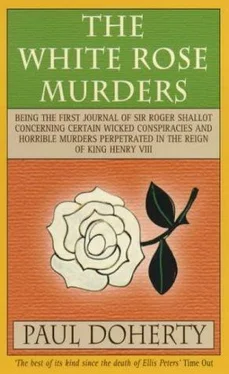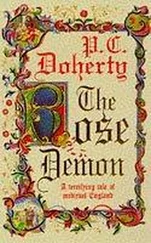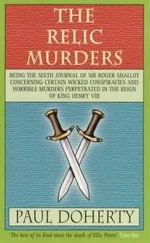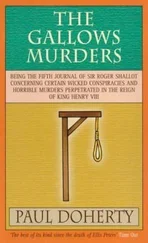Paul Doherty - The White Rose murders
Здесь есть возможность читать онлайн «Paul Doherty - The White Rose murders» весь текст электронной книги совершенно бесплатно (целиком полную версию без сокращений). В некоторых случаях можно слушать аудио, скачать через торрент в формате fb2 и присутствует краткое содержание. Жанр: Исторический детектив, на английском языке. Описание произведения, (предисловие) а так же отзывы посетителей доступны на портале библиотеки ЛибКат.
- Название:The White Rose murders
- Автор:
- Жанр:
- Год:неизвестен
- ISBN:нет данных
- Рейтинг книги:4 / 5. Голосов: 1
-
Избранное:Добавить в избранное
- Отзывы:
-
Ваша оценка:
- 80
- 1
- 2
- 3
- 4
- 5
The White Rose murders: краткое содержание, описание и аннотация
Предлагаем к чтению аннотацию, описание, краткое содержание или предисловие (зависит от того, что написал сам автор книги «The White Rose murders»). Если вы не нашли необходимую информацию о книге — напишите в комментариях, мы постараемся отыскать её.
The White Rose murders — читать онлайн бесплатно полную книгу (весь текст) целиком
Ниже представлен текст книги, разбитый по страницам. Система сохранения места последней прочитанной страницы, позволяет с удобством читать онлайн бесплатно книгу «The White Rose murders», без необходимости каждый раз заново искать на чём Вы остановились. Поставьте закладку, и сможете в любой момент перейти на страницу, на которой закончили чтение.
Интервал:
Закладка:
Three less than twelve should it be,
Or the King, no prince engendered he.
The lamb did rest In the falcon's nest,
The Lion cried, Even though it died.
The truth Now Stands, In the Sacred Hands,
Of the place which owns Dionysius' bones.
'Hell's teeth, Master!' I whispered. 'What does it mean?'
'The first two lines,' Benjamin replied, 'are what Selkirk was always chanting. Perhaps it's a cipher? Each word standing for something else?'
'At least,' I replied bitterly, 'we have something to show the Cardinal when he sends for us!'
Chapter 3
My words were prophetic. The next morning was clear and bright. A strong sun was burning off the river mist as Melford swaggered into our chamber and announced, 'The Lord Cardinal wishes to see you both. He has also ordered that on the way I should show you something.'
Do you know, I sensed what was coming as we grabbed ' our cloaks and followed Melford out of the Tower. My worst fears were confirmed when, instead of taking a barge, Melford, striding ahead of us, took us up Aldgate and into the stinking city streets. Benjamin sidled closer.
'What do you think is going to happen, Roger? Where is Melford taking us? Is my uncle the Lord Cardinal angry? I am no assassin.'
'Oh, I am sure there is nothing to worry about,' I lied. 'Melford is going to show us the marvels of the city, perhaps buy us a pastry and a pie from the cookshops. Maybe a visit to a bear garden or a drink in some snug tavern.'
My master smiled, the cloud lifting from his open face. I glanced away in desperation. (He was, in some ways, such an innocent!) We walked on past St Mildred's Church, Scalding Alley and the Poultry Compter. I pointed out the mansion near the Walbrook which Sir Thomas More had recently bought, and the houses of other court dignitaries. I had to chatter to still my nerves. We went through Cheapside where the rickety stalls of the poor traders housed loud-mouthed apprentices who offered us garish threads, fustian hats, trinkets, gee-gaws and other baubles.
My master, essentially a country boy, stopped at one stall but Melford spun on his heel and came back, his hand on his dagger. Benjamin, recognising the anger in his eyes, hastily dropped the object he was inspecting and followed on.
At last we came to Newgate Prison, the huge, ugly gaol built on the old city wall – a ghastly sight, made no pleasanter by the smells and smoke from the neighbouring butchers' shambles, whilst the gully in the centre of the street was choked with rubbish. The odour was so foul, Melford took a pomander from his wallet and held it to his nose. A great crowd had assembled, all eyes fixed on the ironbound gates of the prison. A trumpet sounded, its shrill blasts quieting the crowd before the gates opened to a great roar from the throng. Even the costermongers, wheeling their carts laden with baskets of bread, cooked meats and fruit, stopped plying their trade and looked up.
I saw a horse, three black plumes dancing between its ears. A tambour sounded, every beat silencing the clamour around us. The crowd shifted as Melford pushed forward. We saw the drummer walking before the horse which pulled a cart surrounded by guards, halberds half-lowered. The driver was clad in black leather from head to foot, his face covered by a lace-trimmed, orange mask with slits for the eyes and mouth. The cart itself was huge and decorated with the symbols of death. In it stood a man, his red hair shimmering in the sun. Beside him a priest muttered the prayers for the dying. Oh, I remembered my trial in Ipswich and knew the terror that was coming.
I peered between the slats of the cart and glimpsed the cheap pine-wood coffin. My master's face grew dullish pale. I thought he was going to faint or even run away but Melford was now standing between us, forcing us to follow the death cart. We did so, like mourners, as the procession slowly snaked down to the Elms at Smithfield, stopping only at the Angel for the usual bowl of ale for the condemned prisoner.
He looked as if he needed it; his face was one purple mask of bruises. He could hardly stand: there were angry welts across his bare shoulder and one arm hung awkwardly in its socket. At last, the cart trundled up to the great three-branched scaffold raised high on a platform next to a butcher's block in which a huge meat cleaver had been embedded. Another executioner, dressed in a dirty apron, hobbled on one lame leg across the platform and placed the noose round the prisoner's neck. The orange-masked driver whipped up the horse and pulled away, leaving the poor man to dance in the air. Suddenly white roses were thrown from the crowd and an urchin sprang on to the traitor's kicking legs. The boy pulled him down so quickly that, even from where I stood, I heard the click of his neck breaking. The urchin jumped down and scampered off.
Benjamin turned away and vomited, raising a catcall of abuse from some old crones who had gathered there to watch the fun: they were disappointed that the additional punishments of decapitation, castration and disembowelling were now no longer necessary. Melford, his own disappointment also apparent, turned and, with a snap of his fingers and a sharp curt order, indicated we should follow on.
'This was a warning, was it not?' Benjamin whispered, wiping his mouth on the back of his hand.
I praised him for his perspicacity. However, let me assure you, my master was no fool, just an innocent in the wicked ways of the world. I freely admit to my own terror. I felt faint with the heat, the crowd and the sight of that ghastly, twitching body.
We arrived at Westminster. Melford kept showing Wolsey's warrant to various officials until a steward, wearing the Cardinal's livery – three tasselled hats against a scarlet background – led us upstairs to the royal apartments. We encountered more guards and more questions until a great iron-studded door was thrown open and we entered an antechamber which reeked of wealth: great carved chairs and desks, finely wrought tables with spindly legs and tops cleverly covered with silver and topaz. My fingers itched to caress these valuables but Benjamin and I were ushered on into the Cardinal's presence. He was sitting in his throne-like chair, swathed in his scarlet robes. The light danced on the huge pectoral cross hanging from a chain round his neck and shimmered in the sparkling diamonds which covered his fingers.
Clerks scurried to and fro, bearing piles of documents. There was a smell of fresh wax and resin for the Lord Cardinal was sealing warrants which decreed life, wealth, freedom, prison, exile, as well as bloody death at Tower Hill, or Smithfield Common. Wolsey glanced up and stared at us, his small eyes hard as flint, and I knew what the psalmist meant when he described fear turning his bowels to water. On that occasion, mine nearly did and I quietly thanked God I was wearing thick, brown pantaloons for I did not wish to disgrace myself. The Cardinal picked up a silver bell from the desk beside him and rang it gently. A tocsin itself could not have wrought such an effect: all the clerks stopped their business and the room fell silent. Wolsey muttered a few words and his servants vanished as swiftly as peasants before the tax collectors.
After they had gone, the chamber remained silent except for the buzzing of angry flies and my Lord Cardinal's favourite greyhound busy crapping in a corner under a red and gold arras. Benjamin doffed his cap and swept his uncle a most courtly bow. I followed suit. The Cardinal studied us morosely as his greyhound went to gobble the remains of a meal from a silver dish.
'Benjamin, Benjamin, my dear nephew.'
Melford sidled up, whispered in the Cardinal's ear, grinned sourly at us and quietly left. As he did so, Doctor Agrippa and Sir Robert Catesby slipped into the room and sat on either side of the Cardinal. Once again the bell was tinkled: a servant entered bearing a jewel-encrusted tray. It bore five Venetian glasses, tall and thin-stemmed with bands of precious silver round the rims.
Читать дальшеИнтервал:
Закладка:
Похожие книги на «The White Rose murders»
Представляем Вашему вниманию похожие книги на «The White Rose murders» списком для выбора. Мы отобрали схожую по названию и смыслу литературу в надежде предоставить читателям больше вариантов отыскать новые, интересные, ещё непрочитанные произведения.
Обсуждение, отзывы о книге «The White Rose murders» и просто собственные мнения читателей. Оставьте ваши комментарии, напишите, что Вы думаете о произведении, его смысле или главных героях. Укажите что конкретно понравилось, а что нет, и почему Вы так считаете.












